
Richard Serra interview with Charlie Rose
Having been an enormous admirer and follower of Serras' work for years, I would like to share this brief interview that took place in 2002. What follows is a partial transcript of the interview. Probably only the first few minutes.
RICHARD SERRA AND CHARLIE ROSE - 2002 TRANSCRIPT of Interview at Gagosian Gallery:
Q: If I went back to the very beginning of Richard Serra's life what would be the earliest thing that I found that might suggest who he is today?
A: Uh, probably a little kid walking along the beach for a couple of miles, turning around, walking back, looking at his footprints, and being amazed that what was on his right in one direction, when he reversed himself, was now on his left, and it was completely different, and it startled him and he never got over it.
Q: He was how old?
A: Four or five.
Q: Yeah, on the beach.
A: On the beach.
Q: This is San Francisco?
A: Yes.
Q: What was it? I mean, in looking back now, even though you wouldn't have captured the profundity of it at that time.
A: I think certain things stick into your claw, or stick into your imagination, and you have a need to come to terms with them. And spacial differences, what's on your left, what's on your right, what it means to walk around a curve; looking at a convexity and looking at a concavity -- just asking fundamental questions about what you don't understand, those things have always interested me.
Q: You are (don't be modest) are judged to be one of our best, if not our best sculptor. What's the connection between the talent you have, and what it was naturally that made you want to look at those footprints?
A: Curiosity, inquisitiveness, and I used to draw everyday, and I used to draw in order to please my parents, because my brother was taller and bigger and stronger, and in order to capture my affection of my parents, really, to compete with my brother, I would draw every night after dinner and my parents would encourage that drawing. So, drawing became for me another language, it became a language that was a kind of key into the world - it kind of mediated reality for me, so I've been drawing since I was four years old. And my parents encouraged it, and encouragement kind of breeds confidence.
Q: Did you have a natural talent?
A: For drawing? Yes, always. I remember when I was in the second grade, about seven years old, the teacher had my mother come to my school because she'd pasted my drawings all over the walls for everyone, for the whole school to see. It was something I had a facility for.
Q: And she said to your mother, 'look this is something that needs to be nurtured'?
A: Yes, and my mother immediately started dragging me to museums. And my mother didn't introduce me as Richard, she used to introduce me as 'Richard the artist' which I was very embarrassed by.
Q: (laughter) Yeah, this could do something to you if you're not careful.
A: No, and because of that I thought I would major in English language, and I did, I majored in English, and I thought 'drawing is something I could always do' and I would find my way into it, and eventually what happened was that I went to the University of California and I transferred to Santa Barbara. Santa Barbara was a tremendous hotbed of intellectual activity. Isherwood was there and ____, and I sent seven drawings to Yale after majoring in English literature, and Yale accepted me saying, 'we think we could teach you something.' Because I hadn't been painting up to that point. And that was the big breakthrough of my life. They made me get their undergraduate Art History degree, and then I stayed two more years and got an MFA -- an MA and an MFA.
Q: The acceptance by Yale did what.
A: Well, I was thrown into a group of students, a couple of them are still here in New York painting very well, Bryce Martin, Chuck Close, a lot of really famous people at the time, and we were all young art students from all over the country, thrown together in a very competitive atmosphere, with terrific professors and up to that point, I could take education seriously, but not that seriously

No comments:
Post a Comment